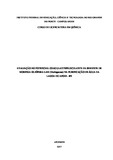Avaliação do potencial coagulante/floculante da semente de Moringa Oleífera Lam (Moringaceae) na purificação de água da Lagoa do Apodi-RN
Data
2018-01-30Autor
Sousa, Alice
http://lattes.cnpq.br/3264395595125502
Metadado
Mostrar registro completoResumo
Water is one of the most important goods for man, about 97.5% of the water on the planet is salty, present in the seas and oceans, the other 2.5% are fresh water available for human consumption, present mainly rivers, lakes and glaciers. Even with very little fresh water for people's consumption, some of it still suffers from the contamination caused by man-made activities. In view of this problem, this work aims to evaluate the potential of coagulation present in the Moringa Oleífera Lam seed in the treatment of polluted waters of the Apodi Lagoon, located in the state of Rio Grande do Norte. Initially, a water collection was carried out in Apodi Lagoon and sent to the laboratory of the IFRN Apodi campus, where some physical-chemical analyzes were performed. For the water treatment procedure two types of experiments were carried out, one water sample was submitted to a procedure with the moringa seeds after the oil was extracted, while another water sample was treated with the seeds containing the oil. After the water purification process with the moringa seeds, the physical-chemical analyzes were carried out again to make a comparison of the efficiency of the seeds. The results obtained with this methodology were considered very satisfactory, because in all the physical-chemical analyzes, there was a reduction of the analyzed concentrations, thus indicating that the moringa presents a very good coagulating capacity. The results of Electric Conductivity (EC), Hydrogenion Potential (pH), Alkalinity, Chloride and Salinity presented the best results when the treatment was performed with the moringa seeds without the oil, while the Total Solids, Turbidity, Total Hardness , Hardness of Calcium and Magnesium and Nitrate, presented the best results with the treatment using the moringa seeds with the oil.




